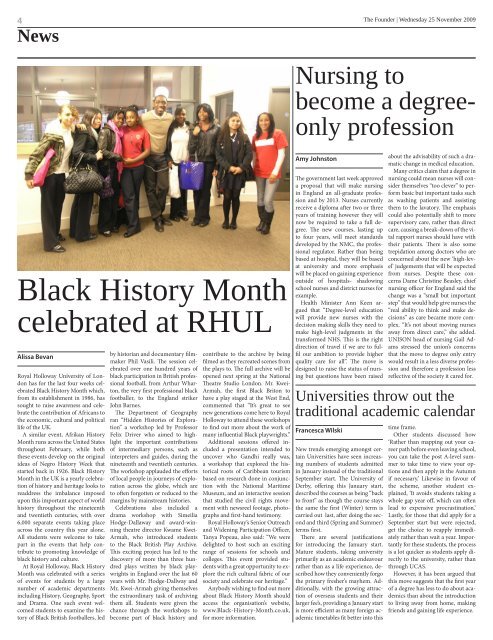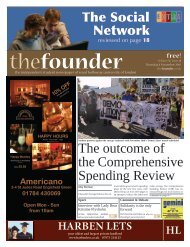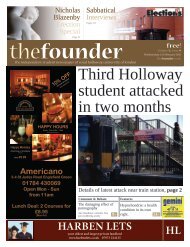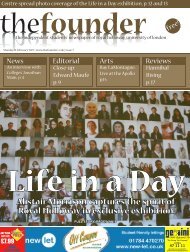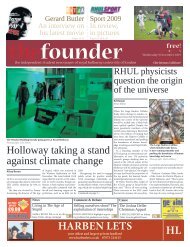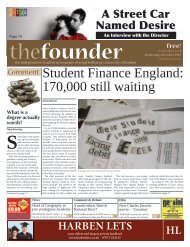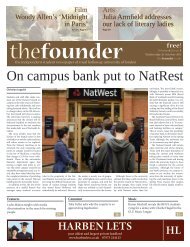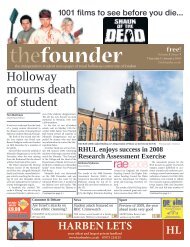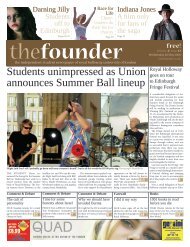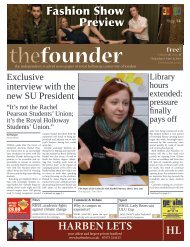Government cuts Founders' Building upkeep fund - The Founder
Government cuts Founders' Building upkeep fund - The Founder
Government cuts Founders' Building upkeep fund - The Founder
You also want an ePaper? Increase the reach of your titles
YUMPU automatically turns print PDFs into web optimized ePapers that Google loves.
4 <strong>The</strong> <strong>Founder</strong> | Wednesday 25 November 2009<br />
News<br />
Nursing to<br />
become a degreeonly<br />
profession<br />
Black History Month<br />
celebrated at RHUL<br />
Alissa Bevan<br />
Royal Holloway University of London<br />
has for the last four weeks celebrated<br />
Black History Month which,<br />
from its establishment in 1986, has<br />
sought to raise awareness and celebrate<br />
the contribution of Africans to<br />
the economic, cultural and political<br />
life of the UK.<br />
A similar event, Afrikan History<br />
Month runs across the United States<br />
throughout February, while both<br />
these events develop on the original<br />
ideas of Negro History Week that<br />
started back in 1926. Black History<br />
Month in the UK is a yearly celebration<br />
of history and heritage looks to<br />
readdress the imbalance imposed<br />
upon this important aspect of world<br />
history throughout the nineteenth<br />
and twentieth centuries, with over<br />
6,000 separate events taking place<br />
across the country this year alone.<br />
All students were welcome to take<br />
part in the events that help contribute<br />
to promoting knowledge of<br />
black history and culture.<br />
At Royal Holloway, Black History<br />
Month was celebrated with a series<br />
of events for students by a large<br />
number of academic departments<br />
including History, Geography, Sport<br />
and Drama. One such event welcomed<br />
students to examine the history<br />
of Black British footballers, led<br />
by historian and documentary filmmaker<br />
Phil Vasili. <strong>The</strong> session celebrated<br />
over one hundred years of<br />
black participation in British professional<br />
football, from Arthur Wharton,<br />
the very first professional black<br />
footballer, to the England striker<br />
John Barnes.<br />
<strong>The</strong> Department of Geography<br />
ran “Hidden Histories of Exploration”<br />
a workshop led by Professor<br />
Felix Driver who aimed to highlight<br />
the important contributions<br />
of intermediary persons, such as<br />
interpreters and guides, during the<br />
nineteenth and twentieth centuries.<br />
<strong>The</strong> workshop applauded the efforts<br />
of local people in journeys of exploration<br />
across the globe, which are<br />
to often forgotten or reduced to the<br />
margins by mainstream histories.<br />
Celebrations also included a<br />
drama workshop with Simeilia<br />
Hodge-Dallaway and award-winning<br />
theatre director Kwame Kwei-<br />
Armah, who introduced students<br />
to the Black British Play Archive.<br />
This exciting project has led to the<br />
discovery of more than three hundred<br />
plays written by black playwrights<br />
in England over the last 60<br />
years with Mr. Hodge-Dallway and<br />
Mr, Kwei-Armah giving themselves<br />
the extraordinary task of archiving<br />
them all. Students were given the<br />
chance through the workshops to<br />
become part of black history and<br />
contribute to the archive by being<br />
filmed as they recreated scenes from<br />
the plays to. <strong>The</strong> full archive will be<br />
opened next spring at the National<br />
<strong>The</strong>atre Studio London. Mr. Kwei-<br />
Armah, the first Black Briton to<br />
have a play staged at the West End,<br />
commented that “It’s great to see<br />
new generations come here to Royal<br />
Holloway to attend these workshops<br />
to find out more about the work of<br />
many influential Black playwrights.”<br />
Additional sessions offered included<br />
a presentation intended to<br />
uncover who Gandhi really was,<br />
a workshop that explored the historical<br />
roots of Caribbean tourism<br />
based on research done in conjunction<br />
with the National Maritime<br />
Museum, and an interactive session<br />
that studied the civil rights movement<br />
with newsreel footage, photographs<br />
and first-hand testimony.<br />
Royal Holloway’s Senior Outreach<br />
and Widening Participation Officer,<br />
Tanya Popeau, also said: “We were<br />
delighted to host such an exciting<br />
range of sessions for schools and<br />
colleges. This event provided students<br />
with a great opportunity to explore<br />
the rich cultural fabric of our<br />
society and celebrate our heritage.”<br />
Anybody wishing to find out more<br />
about Black History Month should<br />
access the organisation’s website,<br />
www.Black-History-Month.co.uk,<br />
for more information.<br />
Amy Johnston<br />
<strong>The</strong> government last week approved<br />
a proposal that will make nursing<br />
in England an all-graduate profession<br />
and by 2013. Nurses currently<br />
receive a diploma after two or three<br />
years of training however they will<br />
now be required to take a full degree.<br />
<strong>The</strong> new courses, lasting up<br />
to four years, will meet standards<br />
developed by the NMC, the professional<br />
regulator. Rather than being<br />
based at hospital, they will be based<br />
at university and more emphasis<br />
will be placed on gaining experience<br />
outside of hospitals- shadowing<br />
school nurses and district nurses for<br />
example.<br />
Health Minister Ann Keen argued<br />
that “Degree-level education<br />
will provide new nurses with the<br />
decision making skills they need to<br />
make high-level judgments in the<br />
transformed NHS. This is the right<br />
direction of travel if we are to fulfil<br />
our ambition to provide higher<br />
quality care for all”. <strong>The</strong> move is<br />
designed to raise the status of nursing<br />
but questions have been raised<br />
about the advisability of such a dramatic<br />
change in medical education.<br />
Many critics claim that a degree in<br />
nursing could mean nurses will consider<br />
themselves “too clever” to perform<br />
basic but important tasks such<br />
as washing patients and assisting<br />
them to the lavatory. <strong>The</strong> emphasis<br />
could also potentially shift to more<br />
supervisory care, rather than direct<br />
care, causing a break-down of the vital<br />
rapport nurses should have with<br />
their patients. <strong>The</strong>re is also some<br />
trepidation among doctors who are<br />
concerned about the new ‘high-level’<br />
judgements that will be expected<br />
from nurses. Despite these concerns<br />
Dame Christine Beasley, chief<br />
nursing officer for England said the<br />
change was a “small but important<br />
step” that would help give nurses the<br />
“real ability to think and make decisions”<br />
as care became more complex.<br />
“It’s not about moving nurses<br />
away from direct care,” she added.<br />
UNISON head of nursing Gail Adams<br />
stressed the union’s concerns<br />
that the move to degree only entry<br />
would result in a less diverse profession<br />
and therefore a profession less<br />
reflective of the society it cared for.<br />
Universities throw out the<br />
traditional academic calendar<br />
Francesca Wilski<br />
New trends emerging amongst certain<br />
Universities have seen increasing<br />
numbers of students admitted<br />
in January instead of the traditional<br />
September start. <strong>The</strong> University of<br />
Derby, offering this January start,<br />
described the courses as being “back<br />
to front” as though the course stays<br />
the same the first (Winter) term is<br />
carried out last, after doing the second<br />
and third (Spring and Summer)<br />
terms first.<br />
<strong>The</strong>re are several justifications<br />
for introducing the January start.<br />
Mature students, taking university<br />
primarily as an academic endeavour<br />
rather than as a life experience, described<br />
how they conveniently forgo<br />
the primary fresher’s mayhem. Additionally,<br />
with the growing attraction<br />
of overseas students and their<br />
larger fee’s, providing a January start<br />
is more efficient as many foreign academic<br />
timetables fit better into this<br />
time frame.<br />
Other students discussed how<br />
‘Rather than mapping out your career<br />
path before even leaving school,<br />
you can take the post A-level summer<br />
to take time to view your options<br />
and then apply in the Autumn<br />
if necessary.’ Likewise in favour of<br />
the scheme, another student explained,<br />
‘It avoids students taking a<br />
whole gap year off, which can often<br />
lead to expensive procrastination.’<br />
Lastly, for those that did apply for a<br />
September start but were rejected,<br />
get the choice to reapply immediately<br />
rather than wait a year. Importantly<br />
for these students, the process<br />
is a lot quicker as students apply directly<br />
to the university, rather than<br />
through UCAS.<br />
However, it has been argued that<br />
this move suggests that the first year<br />
of a degree has less to do about academics<br />
than about the introduction<br />
to living away from home, making<br />
friends and gaining life experience.


